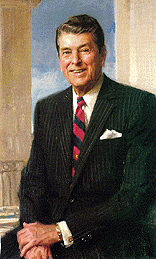About Ron Reagan Jr.
Ron Reagan may be best known as the younger son of our fortieth president, but he may be best admired for his courage to speak out for what he believes. Ron Reagan is an avid spokesperson for stem cell research, going so far as to speak at the 2004 Democratic National Convention to promote his cause. It is important to him to see advances in medical therapy for diabetes, Parkinson's, and the Alzheimer's that claimed his father, President Ronald Reagan, as well as for other diseases. When Ron Reagan argues against President George W. Bush or breaks from his family's roots in the Republican Party, the potential for cures far exceeds the potential rifts.A registered Independent from one of the most beloved Republican families, Ron Reagan says, "I have no choice but to speak for myself. It's all I've got; nobody's telling me what to say." As his father taught by exemplifying kindness and respect, Ron teaches us a lesson in the importance of speaking up.
To read more about Ron Reagan, Jr. on myhero.com, CLICK HERE
 |
 |
What I learned from my father is that it doesn't matter who you are, but how you act. What counts is your kindness and gentleness, and your ability to forgive. Those are the qualities that really define each of us, and separate out the true heroes. By virtue of his position in life, my father was a powerful person as far back as I can remember, and in two exceptionally heady worlds --Hollywood and politics. Yet my father never let any of it go to his head and he never let it corrupt his core sensibility, which was all about decency.
From Hollywood to the White House, growing up my father's son meant always living in the midst of famous people, and I saw early and often just how arrogant the famous can be. So I learned at a tender age that people may possess truly impressive talents for which they are highly celebrated, yet still fall short as human beings. If you don't treat people with decency, then how important is it really that you can perform extraordinary feats on a football field, or that you’ve won an armful of Oscars?
In my entire life, I never saw my father, for all the power he had, either as an actor or as president, yell at anyone. No matter what you did or who you were--the Prime Minister, the Queen, or the guy who shined his shoes or cut his hair--my father extended to everyone the same courtesy and respect, treating everyone the same.
In addition to these fundamental lessons in character, I also learned from my father about empathy and compassion--the two qualities that I value above all others. Whenever as kids growing up we would be irate at somebody for some real or imagined transgression, he'd always ask us to flip the coin, and consider the other person's vantage point. "For all you know this person was having the worst day of their whole life. Perhaps something tragic happened, and they suffered some terrible loss. So, perhaps you need to cut them a little slack."
 |
The capacity for true compassion, and the ability to share another person's pain, that's the stuff that really counts (not the window dressing of status and celebrity). Look at any of the great religions and philosophies throughout history and you'll always find--across the board--the same big three: empathy, compassion, and forgiveness. It really does all come down to "doing unto others as you would have done unto you."
So, I guess I'd have to say that it was my father who instilled in me an appreciation for the qualities that I consider to be the true measure of heroes. But it is the Tibetan monks living in China, more than anyone else, who are true heroes to me. The monks' empathy, compassion, and amazing ability to forgive truly inspire me. They have seen the genocide of their people, their monasteries destroyed, and a sacred way of life desiccated at the hands of the Chinese. Over the years they have been tortured and brutalized, but instead of being angry, resentful and vengeful, they forgive their tormentors. The monks feel compassion for those seeking to achieve their demise. They see their tormentors as beings of suffering and delusion who are heaping problems onto themselves.
I saw my father's own capacity to achieve such transcendent forgiveness. After being shot by John Hinckley, my father almost immediately forgave him. Pope John Paul II forgave his would-be assassin as well. Nelson Mandela forgave, most eloquently and in public, the injustice he suffered at the hands of his captors, as terrible as those injustices were. He did so not only for his own redemption but also for that of his country. To call forth compassion when you are facing great torment is to me the sign of true strength and character.
As for me, I see myself as a work in progress. I still have to remind myself to be more understanding. I still lose my temper, and I struggle to forgive people. It doesn't come naturally. And I often chide myself after the fact when I have lost my temper. Looking to my father, the Tibetan Monks, and Nelson Mandela, I see the qualities that I most admire in heroes and I have come to count on them, my heroes, to light the way and to show me the right thing to do.
Page created on 8/11/2014 6:42:23 PM
Last edited 8/27/2018 7:55:33 PM
Copyright 2005 by The MY HERO Project
MY HERO thanks Ron Reagan Jr. for contributing this essay to My Hero: Extraordinary People on the Heroes Who Inspire Them.
Thanks to Free Press for reprint rights of the above material.
